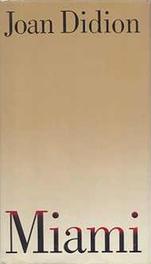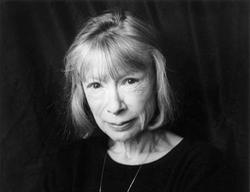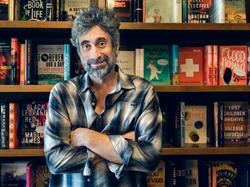|
|||
|
|||
Mitchell Kaplan, owner of Books & Books in South Florida, remembers Joan Didion:
The loss of Joan Didion hits hard.
As a young bookseller, one day I received a call at our old Gables store and the soft voice on the other end asked, "Is this Mitchell Kaplan? I'm Joan Didion." I probably just turned 30 and was stunned that Joan Didion would be calling me. As it happened, Joan was doing research on her Miami book and a friend of hers suggested that I could show her around and give her some insight into what was happening down here. This was the Miami of Year of Dangerous Days, the Miami before South Beach was cool, before Art Deco was a thing; it was the Miami of riots, refugees and cocaine, although those in the know knew that Miami was changing. Someone as attuned to what was happening in our culture as Joan, of course, wanted to see Miami for herself.
So, we met at the bookstore and I took her on a tour of my Miami. We went to the newly awakened Miami Beach, passing the scrub islands in Biscayne Bay that were recently wrapped by Christo, pointing out those decaying hotels on Ocean Drive, explaining the social history of the old, the Cuban diaspora, the dilapidated, crime infested area south of 5th street, showing her the faded glamour of the Fontainebleau and the other hotels north of 41st Street. (When we passed the Doral Hotel, she exclaimed, "So, that's what it looks like. I used it in Democracy, but I've never seen it until now.") I shared with her as much as I knew of the political winds blowing through South Florida and suggested certain people she should meet. She was laser focused and not one for small talk--I now realize the extent of her shyness--so, of course, I kept talking, probably too much. I was one of many she connected with, but even now, almost 35 years later, I can relive that drive through Miami with Joan as if it were yesterday.
 When Miami came out, as you might imagine, she spent lots of time here, and then she kept coming for a number of years to see the city play out its story. On one trip she came with her husband and film partner, John Gregory Dunne. One of John's books was just published and the two of them came to our original, small store on the corner and spent some time browsing. The store was crammed with books, each one spine out on the shelf, including John's (I was so happy that we had it in stock), but after they left, I noticed that the only face out book in the entire store was John's and that it was clearly the work of Joan.
When Miami came out, as you might imagine, she spent lots of time here, and then she kept coming for a number of years to see the city play out its story. On one trip she came with her husband and film partner, John Gregory Dunne. One of John's books was just published and the two of them came to our original, small store on the corner and spent some time browsing. The store was crammed with books, each one spine out on the shelf, including John's (I was so happy that we had it in stock), but after they left, I noticed that the only face out book in the entire store was John's and that it was clearly the work of Joan.
Over the next three decades, Joan would come to Miami with each book until she no longer traveled. We saw each other infrequently after that, but her sensibility, her lightness of being stayed with me and the tragedies that found her later made me, like so many others, very sad.
In the obits I've been reading, a line in one of them left me empty; it included something like "she had no direct next of kin." But, really, we, her readers, are all her "next of kin."
Here's a quote from her--there are so many--taken from a commencement address that I really like:
"I'm not telling you to make the world better, because I don't think that progress is necessarily part of the package. I'm just telling you to live in it. Not just to endure it, not just to suffer it, not just to pass through it, but to live in it. To look at it. To try to get the picture. To live recklessly. To take chances. To make your own work and take pride in it. To seize the moment. And if you ask me why you should bother to do that, I could tell you that the grave's a fine and private place, but none I think do there embrace. Nor do they sing there, or write, or argue, or see the tidal bore on the Amazon, or touch their children. And that's what there is to do and get it while you can and good luck at it."



